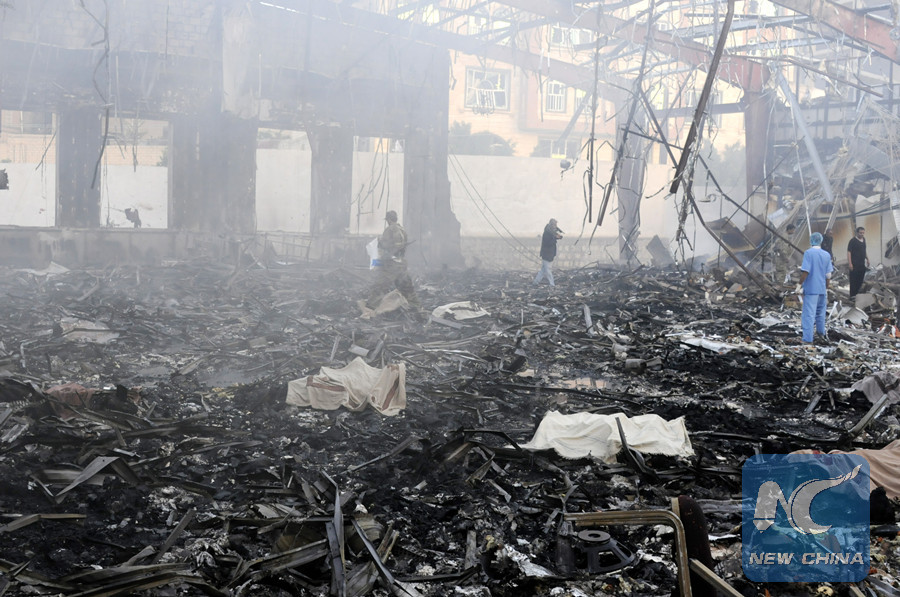
People search for victims inside a funeral hall after it was targeted by airstrikes in Sanaa, Yemen, on Oct. 8, 2016. (Xinhua Photo)
SANAA, Oct. 9 (Xinhua) -- At least 458 people, almost all civilians, were killed and 514 others injured in a double-tap airstrike by the Saudi-led coalition on a mourning ceremony in Yemen's capital Sanaa on Saturday, officials said.
The attack came shortly after the UN envoy to Yemen Ismail Ould Cheikh announced that the factions had agreed on a 72-hour ceasefire and to resume peace talks.
The airstrike, as part of recent military escalation by all parties to the conflict, has deepened the uncertainty of the peace process in the country, observers said.
Adil Al-Shuja'a, professor of politics at Sanaa University, said the Saturday's massacre blew up the fragile peace process and will result in further escalation.
"Violence begets violence. Furthermore, massacres are continuing, while the international community is still unable to take action," Al-Shuja'a said. "UN can't guarantee an effective ceasefire. It can't guarantee protection of civilians and prevent violation of the laws of war. How can it run a successful peace process then?" he added.
The Houthi-Saleh supreme political council has issued a statement vowing to take revenge and affirming that the massacre is a criminal act that will cast a cloud on the political process.
MILITARY FAILURE
During September and August, the coalition killed more than 100 civilians, and local organizations said indiscriminate Houthi shelling, mostly in Taiz province, killed around 100 civilians including children.
Observers argued that repeated attacks on civilians expose the failure of the Arab coalition and the Yemeni factions in achieving a military victory on the ground.
Even if we assume the Saudi-led coalition lacks precise information about military targets, repeated attacks on civilians tell us about real attitudes toward the peace process, observers said.
"Saudi Arabia is facing mounting pressure over possible war crimes, catastrophic impacts, humanitarian crisis in particular after its military intervention and inability to help make peace talks a success," Al-Shuja'a said.
"International silence and what appears to be international collision are also leading to more violations of the laws of war in Yemen," he added.
OUTSIDER' DILEMMA
The UN has sponsored several rounds of peace talks in a bid to end the conflict which has put the country on the brink of famine and a total economic collapse, but all rounds failed to reach a deal.
Fuad Alsalahi, professor of political sociology at Sanaa University, said the UN does not give priority to Yemen as the world is giving more attention to Syria.
"In the end, the peaceful solution in Yemen will be based on agreements with all regional and international players including Iran and Russia. Such an assumption requires the legitimate good government to engage Iran and Russia in direct talks over the situation in the country," Alsalahi said.
"Meanwhile, the most important foundation for a peaceful solution is that the Yemenis overcome foreign meddling. Yemenis need to heal the national rift and then make foreigners play supporting roles only," he elaborated.
Since the conflict started to escalate in early 2015, observers have been suggesting bringing together Saudi Arabia, the backer of the legitimate government, and Iran, the country allegedly backing the Houthi militants who seized power in late 2014.
Moreover, observers argue that the UN should demonstrate clean performance amid reports that it has come under Saudi pressure or blackmail.

